|
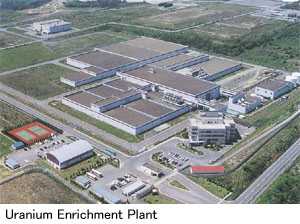 Natural uranium consists
primarily of U-235 and U-238. When neutrons collide, U-235 emits huge amounts of
energy through fission reaction, while nuclear fission does not occur with
U-238. Since natural uranium ore includes only approximately 0.7% U-235, natural
ore itself cannot be used in nuclear power generation with a light water
reactor. It needs to be enriched to a concentration of 3 to 5%. Natural uranium consists
primarily of U-235 and U-238. When neutrons collide, U-235 emits huge amounts of
energy through fission reaction, while nuclear fission does not occur with
U-238. Since natural uranium ore includes only approximately 0.7% U-235, natural
ore itself cannot be used in nuclear power generation with a light water
reactor. It needs to be enriched to a concentration of 3 to 5%.
Putting uranium compound gas
(uranium hexafluoride) into a centrifuge (cascade) rotating at a high speed
separates U-235 and U-238; U-238, a heavier isotope, is pushed outward while
U-235, a lighter isotope, gathers inward. Gas with a higher concentration of
U-235 is sent to another centrifuge. Repeating this process several times
produces usable uranium. This method, developed by the Power Reactor and Nuclear
Fuel Development Corporation(PNC), Japan, is one of the most efficient and safe
uranium enrichment methods in the world.
Plans or the Uranium Enrichment
Plant provide for an ultimate capacity of 1,500 ton-SWU/year, enough to meet one
third of the nuclear fuel needs of nuclear power plants in Japan. Currently, the
Uranium Enrichment Plant is operating with a capacity of 1,050 ton-SWU/year,
which is equivalent to the nuclear fuel used by 8 or 9 reactors at 1,000
MW-class nuclear plants. Regarding a 450ton-SWU/year capacity, the last half of
the 900 ton-SWU/year capacity to be completed in the second phase, a centrifuge
with performance 2.5 to 3 times higher than conventional ones will be adopted.
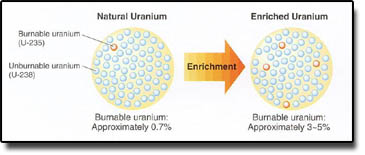
Uranium
Enrichment
The concentration of U-235, with which nuclear fission occurs,
is increased from approximately 0.7% to 3-5%. Enrichment methods include the
gaseous diffusion process, the laser enrichment method, and the centrifuge
process, which JNFL uses. |
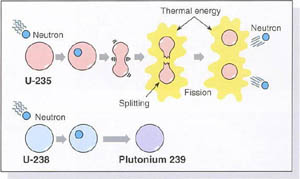
U-235 and
U-238
Uranium, which is used in nuclear power generation, includes U-235
and U-238. These two isotopes of uranium, almost like twins, differ only in the
number of their neutrons. When a U-235 atom absorbs a neutron, it loses
stability, which causes nuclear fission. Nuclear power generation utilizes
thermal energy emitted at the time of nuclear fission. A U-238 nucleus, on the
other hand, does not split when a neutron is absorbed; instead U-238 changes
into plutonium 239. |
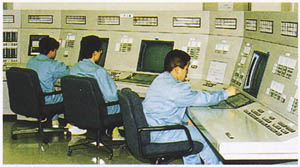
Central Control Room at
the Uranium Enrichment Plant |
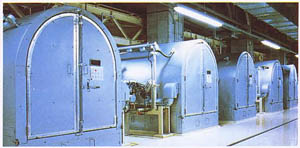
Feed and Withdrawal
Room |
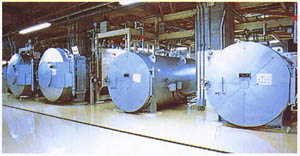
Homogenization
Room |
|
|
|
 |
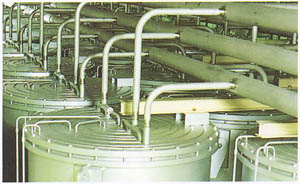
Cascade room where
centrifuges,
linked with each other, and placed
Cascade
Since a single centrifuge can only increase the
enrichment by a slight degree the process must be repeated by many centrifuges
to attain the level of enrichment required for light water reactors. Aseries of
centrifuges -a "Cascade"- is thus liked to produce the neccesary level of
enrichment. |
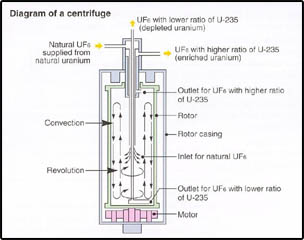
How a centrifuge
works
Like a spin dryer, a rotor spins at extremely
high speeds in the centrifuge so that UF6 gas is pushed toward the
rotor walls by a powerful centrifugal force, thousand times stronger than
gravity. At this time, UF6 with a high proportion of heavy U-238, is
pushed outward, and UF6 with a high proportion of light U-235 tends
to gather around the center. UF6 gas in the center is collected and
is processed into enriched uranium. |
|

